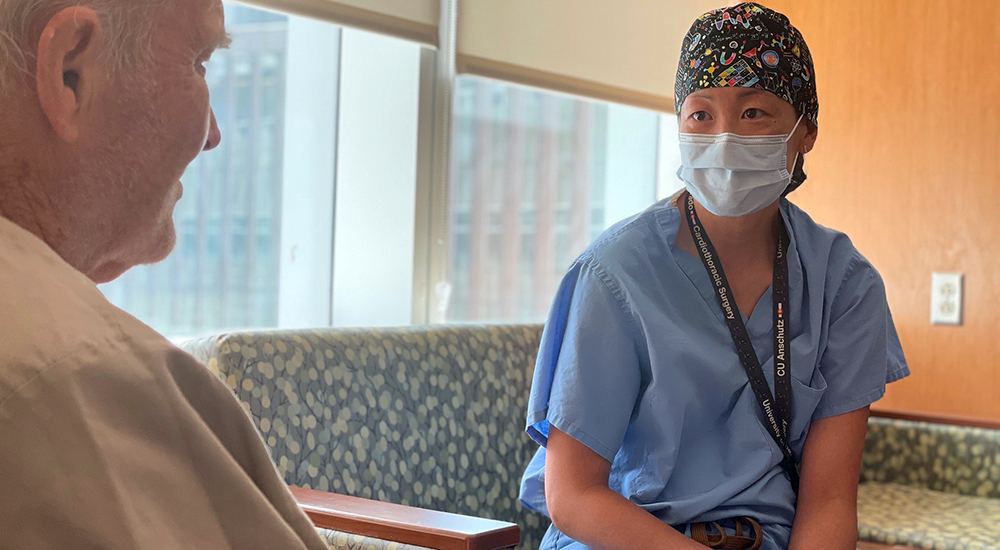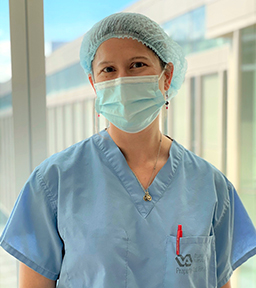In honor of Women’s History Month, we wanted to take a moment to highlight the women surgeons of the VA Eastern Colorado Health Care System. These surgeons follow in the footsteps of Dr. Mary Edwards Walker, the first female surgeon on record in 1855. Not only do these women surgeons provide outstanding care, they are also a welcomed representation for other women – one of the fastest growing groups in the Veteran population.
Dr. Jessica Rove, cardiothoracic surgeon, knocks on Vietnam Veteran Wayne Bullock’s hospital room to check on him while he sits by the window, healing after a major surgery. “How are you feeling?” she asks.
“You are the best,” he says, without hesitation. “I’m recovering quite well. That’s a testament to you and your team.”
Rove took a seat to spend time with her patient (pictured above). She knows that surgery is more than repairing people’s bodies — it’s about trusting relationships. She listens intently to the Veteran as he shares vivid memories of his service and she doesn’t leave without shaking his hand, telling him, “This has been a true honor.”
As one of 13 women surgeons at VA Eastern Colorado Health Care System (ECHCS), Rove and her counterparts dedicate their time to providing Veterans with comprehensive, high-quality care.
Providing care across ten specialties
These women make up 22 percent of all ECHCS surgeons, collectively providing care across 10 specialties for most anything a patient would need from head to toe: Neurology, Ophthalmology; Ear, Nose and Throat (ENT); Cardiothoracic, Vascular, Orthopedic (hand), breast, Gynecologic, Podiatry and general surgery.
As healers, teachers and leaders in their fields of practice, teamwork drives every role they live and work each day.
“It takes a village,” says Dr. Rajshri Bolson, who specializes in orthopedic hand surgery. By 11 a.m. she’s already scrubbing to perform her second surgery of the day – removing a metal plate from a patient’s wrist, a post-fracture injury.
Leading the surgery department into the future
Bolson splits her time between the clinic and administrative duties as assistant chief of Surgery for ECHCS – a system with just over 138,000 enrolled Veterans. When not tending to her busy clinical practice, she’s mentoring medical trainees, studying the latest research, and leading the surgery department into the future with a constant drive to expand patient access and services.
While also giving credit to collegial and home support, Bolson – a wife and mother of two – recognizes the balance she and her colleagues alike must carry through daily, demanding schedules.
“As physicians, there is a lot required of us and it takes a certain kind of person who can juggle it all, remain focused on day-to-day priorities and keep the patients’ needs first and foremost,” says Bolson, who’s been in practice 10 years now. “I’ve been very much inspired by people I have met along the way – both female and male.”
Bolson says she was first drawn to her chosen specialty because she likes to solve problems, to work with her hands, and to have a direct effect on “restoring function” and quality of life for patients. In hand surgery, the goal is very much to help patients return to their job, hobbies and activities of daily living so they literally and figuratively can feed themselves and their loved ones.
Forging the way for other female surgeons
According to a 2019 joint report by the American Medical Association and Association of American Medical Colleges, male doctors dominated orthopedic surgery (85 percent), neurological surgery (82 percent) and thoracic surgery (78 percent) – all specialties represented by ECHCS women surgeons.
Despite these data and the historical challenges women have faced, surgeons like Bolson continue to forge through a traditionally male-dominated field while paving the way for others.
“Certainly, I have benefited from the exceptionally hard work women in medicine have done before me, and more work is still needed,” says breast surgeon Katrina Oyague.
Oyague talks about how the surgical process is “a very unique relationship” that starts with establishing rapport and trust at the time of diagnosis and continues through the actual operation and, finally, recovery and surveillance.
One and a half years into her time with ECHCS, Oyague is grateful to serve the unique needs of women – one of the fastest growing groups in the overall Veteran population. At VA ECHCS alone, nearly 12,000 women Veterans were cared for in fiscal year 2020, an increase by 9% from 2018.
This growth is anticipated to continue and Oyague hopes women Veterans continue to seek VA care for specialty services and women’s specific needs.
Wants women to know about cardiothoracic surgery
Like Oyague, Rove wants all Veterans, including women, to know they can go to VA for care like cardiothoracic surgery. Out of the 200 cardiothoracic cases she’s performed since the Rocky Mountain Regional VA Medical Center opened in August 2018, Rove notes that only two of them were women Veterans, despite the prevalence of cardiac disease found in the general population.
While it will require continued education and outreach to help Veterans — of all gender identities — to understand what services may be available to them, Dr. Brook McConnell, ENT Surgeon, is personally glad Veterans have VA for “equitable, evidence-based care, regardless of their socioeconomic status, insurance status or location of health care delivery.”
When McConnell looks back at her six years and counting with VA, what stands out most to her is being able to work in a daily practice of “actually doing something meaningful and real.”
VA is here to serve all who have served.
Talk with your primary care provider today to learn more about how VA can best serve your unique health care needs and discover what specialty care may be available to you.
Terri Rorke is a public affairs specialist for the VA Eastern Colorado Health Care System.
Topics in this story
More Stories
Veteran Byron Potier weighed almost 300 pounds and was tired and lethargic. He was the perfect candidate for gastric sleeve surgery.
How much do you know about VA care, benefits and services? Don’t miss out on what you've earned—check out the "2025 VA Federal Benefits Guide for Veterans, Dependents, Survivors, and Caregivers" handbook to learn more.
Feeling stressed? Your breath can help you relax and focus. Take 3 minutes to reset and prioritize your well being for this week's #LiveWholeHealth practice.








